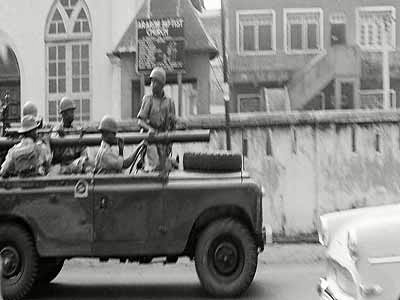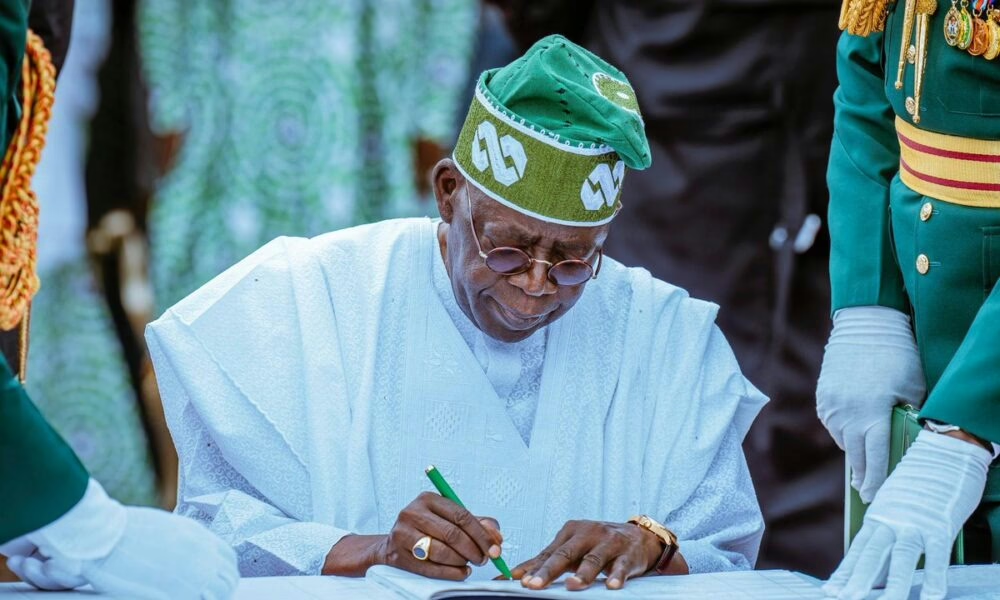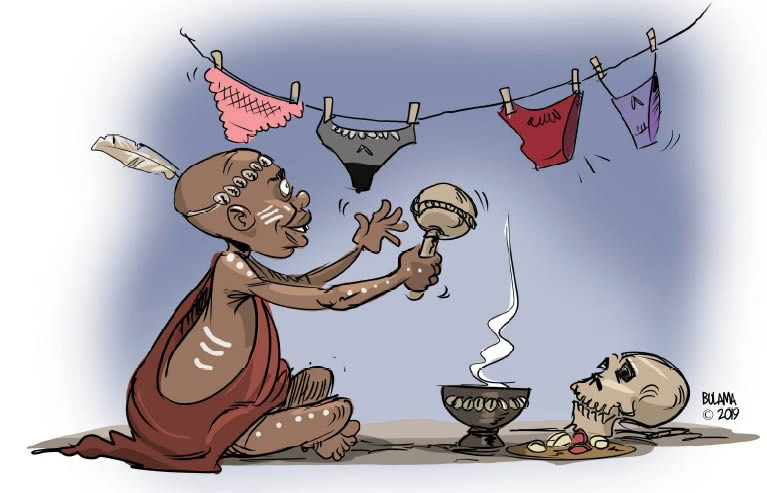Dealers demand N850/litre diesel as Dangote, marketers meet
Aliko Dangote
Oil marketers have called for a downward review in the pump price of the Automotive Gas Oil, popularly called diesel, being produced by the Dangote Petroleum Refinery to between N700 and N850/litre, as operators plan to meet managers of the refinery next week.
The largest downstream marketing association, the Independent Petroleum Marketers Association of Nigeria, which made the call in an interview with , said the N1,225/litre diesel price from the indigenous refinery was high because the commodity was produced in Nigeria and not imported.
The Petroleum Products Retail Outlets Owners Association of Nigeria also called for a reduction in the price of Dangote diesel.
The groups called for the intervention of the Federal Government and urged the managers of the refinery to consider the high cost of logistics required to transport the product from Lagos where the refinery is located.
The oil marketers pointed out that the product is being landed in Nigeria by some importers at N1,250/litre following the appreciation of the naira against the dollar, adding that this should be another reason why the Dangote refinery that produces diesel in Nigeria should cut down its price.
According to the oil marketers, diesel produced at the Dangote refinery has no vessel cost, import charges, and other costs associated with the costs associated with the importation of the commodity into Nigeria.
This came as it was gathered that the marketers under the aegis of IPMAN and Independent Petroleum Marketers Association of Nigeria, and PETROAN held separate meetings on Monday to deliberate on the pricing of petroleum products from the refinery, as well as other issues.
had reported on April 3, 2024, that the $20bn refinery started pumping out diesel to the domestic market the previous Wednesday (March 27, 2024).
The report stated that the refinery sold a minimum of one million litres to each registered oil marketer that got the product from the plant since it commenced diesel sale.
Officials of the multi-billion dollar plant and oil dealers had confirmed that the product was dispensed to marketers at between N1,225/litre and N1,300/litre depending on the volume of purchase.
Reacting to the cost of the commodity during an interview with our correspondent on Monday, the National Public Relations Officer, IPMAN, Chief Chinedu Ukadike, commended the refinery for the commencement in the release of refined products.
He, however, urged the managers of the plant to review the cost of the product downward, providing reasons why the price of Dangote diesel should be cheaper than what was imported.
Ukadike said, “During the construction of the Dangote refinery, we supported and welcomed it. Also, it was our prayers that an indigenous refinery be opened so that it will limit the expenses of logistics in terms of importation, clearing, and other activities associated with bringing products into the country.
“These are some of the hurdles that necessitated the high cost of AGO or diesel being imported into Nigeria. So now that a private refinery with a very high capacity has started producing petroleum products here in Nigeria, we would have appreciated that its products being sold to Nigerians will be cheaper than the landing cost of imported products.
“The dollar is currently about N1,270 to N1,290 and it is coming down. So if the dollar is a determinant factor in terms of the importation of petroleum products and diesel is sold by those companies that imported at N1,300/$, I believe that Dangote refinery should not measure the price of its diesel with the parameter of the forex.”
The IPMAN PRO stated that forex should not be the benchmark for the price of Dangote refinery’s diesel.
“Also, some other expenses on the cost of diesel produced by the refinery have been waived. So those expenses should reflect on the price of the product. The refinery is in Lagos, so there is no vessel voyage cost and this should be deducted from the price Dangote is giving us.
“Other marketers who imported their products are landing it at between N1,200 and N1,250/litre since the drop in forex. So Dangote should be giving us his product at around N700 to N850/litre since he is producing it here.
“When we buy at that price, it will further strengthen the naira, minimise profiteering and reduce the cost of goods and services that are transported using diesel. If you minus the cost spent on vessels, importation charges, and the cost of foreign exchange to some extent, the price of diesel will drop,” Ukadike stated.
He said oil marketers would also submit their price request to the Dangote refinery next week, adding that IPMAN would seek the intervention of the Federal Government on the matter.
“We are trying to seek a meeting with the refinery’s commercial department. I just came out of a meeting to speak with you, where we are discussing how to be able to persuade them to review their prices and also ask the government to intervene,” he said.
When asked to state when the association would meet with the refinery, Ukadike replied. “By next week we should get an appointment. That should be after the Sallah.”
in its story on April 3, 2024, reported that some members of IPMAN had started purchasing the product from the refinery at the N1,225/litre price, though the association had stated that it would seek its price from the managers of the refinery.
“They started pumping out diesel to marketers last week. They also promised to sell aviation fuel soon. Some of my members confirmed this to me after making the purchase,” the National President, the Independent Petroleum Marketers Association of Nigeria, Abubakar Maigandi, had told our correspondent last week.
He added, “So some of our marketers have started getting the product, but as an association, we have not got the product yet, because we want to get the actual rate that it will be sold to us when we buy in bulk. However, they have started selling diesel because some of our marketers have started buying.
“They are selling at N1,225/litre and the minimum volume they are giving is one million litres per marketer. Also, they assured us that they will release more products, but for now this (diesel) is what they are starting with. So we are expecting them to release PMS anytime from now.”
Maigandi had said the move by Dangote would definitely lead to a crash in diesel price, as the commodity rose to a high of about N1,700/litre recently.
“The price of diesel is going to fall because of the release of products from Dangote refinery. It is already coming down in Lagos,” Maigandi stated.
Another oil marketer, who is the Chief Executive, AF Ralph Oil and Gas Ventures, Dr Ralph Arokoyo, had also confirmed that the refinery started the sale of diesel to dealers, adding that the plant started dispensing the product about two weeks ago.
Asked if the Dangote refinery had started supplying diesel to the market, Arokoyo replied, “Yes they have started. They started diesel sales last Wednesday and they have sold to many marketers including members of IPMAN and MEMAN (Major Energy Marketers Association of Nigeria), as well as other private registered independent dealers.”
PETROAN reacts
The President, the Petroleum Products Retail Outlets Owners Association of Nigeria, Billis Gillis-Harry, also stated on Monday that the cost of diesel from the Dangote refinery should be reduced.
He said, “PETROAN has an agreement with Dangote to supply to us at N1,200, but we will still request a downward review. We have over 19,000 members and over 6,800 people are active and ready to do business. So we need to talk about so many issues.
“First of all, the logistics from Lagos to Port Harcourt, Calabar, Warri, Zamfara, and other locations is not very easy. So those in Lagos can take the N1,200/litre price because their cost of logistics is low, but this is not so for dealers outside Lagos.
“So we will certainly still engage with them on how prices will come down. However, the good news is that they have rolled out products and we salute and congratulate them, especially the Executive Director, Commercial, Mr Rabiu Umar, for his courage in making sure Nigeria is wet with refined products.”
Gillis-Harry, however, stated that the refinery would have to recoup the funds used in constructing it, as several billions of dollars were borrowed to develop the plant.
“The refinery has collected billions of dollars as loans to put itself up. It must start to work to pay back these loans. And the only way to get back this money is by producing and selling, as well as exporting.
“Now he has started with domestic sales. So organisations like ours will have to sit down with them and work out the details and this will enable us to know exactly what their cost elements are. We want to sell and they want to produce,” he stated.
The PETROAN president said his association would not want to speak on the proposed cost of petrol that should come from the Dangote refinery until the plant starts producing the commodity for the domestic market.
“You can’t even talk about price when they’ve not started producing. Yes, they have discussed with PETROAN that they would produce PMS, but they have not started producing,” he said.
When told that the refinery was working to release PMS in May, Gillis-Harry said, “They’ve not started producing. So we won’t work on projections. Let them produce first and we will then know what their input, output, and pricing are. That is the only time we can talk about what prices they should sell.
“Dangote refinery has informed PETROAN that they will produce PMS but we await their production, and then we will know the inputs of their production before we talk about the pricing. We can’t tell them what to sell now.”
Dangote officials mum
Officials of the multibillion-dollar refinery decided to stay mute despite several attempts to get their input on the matter.
However, a senior official at the Dangote refinery confirmed last week that the plant had started the sale of diesel to marketers, as the source noted that Premium Motor Spirit, popularly called petrol, would soon be released to the market.
“The product (diesel) is everywhere and they (marketers) are accessing it with ease. The product has been on sale to marketers since last week and the transactions have been better.
“The price of the product in various locations of the country will come down, and it is already coming down in many parts of Lagos since we started releasing products to marketers,” the official, who spoke on condition of anonymity due to lack of authorisation to speak on the matter, had stated.
The Dangote refinery has faced a series of hurdles as it strives to release refined products into the market after it was officially inaugurated by former President Muhammadu Buhari in May last year.
On February 8, 2024, The PUNCH reported that indications emerged that lingering regulatory approvals stalled Dangote Petrochemical Refinery’s plan to release aviation fuel (Jet A1) and diesel for sale in the Nigerian market in January.
The report stated that weeks after the January 31 timeline set by the management of Africa’s largest refinery to begin the sale of its petroleum product in the local market, the refinery was still battling to cross the hurdles of the several layers of regulatory approvals.
It stated that the development came after the refinery began the production of refined petroleum products at the expansive facility.
On January 12, 2024, Dangote refinery announced that it had commenced the production of Automotive Gas Oil, popularly called diesel, and aviation fuel or JetA1.
Aliko Dangote, in a statement issued by his firm at the time, thanked President Bola Tinubu for his support, encouragement, and thoughtful advice towards the actualisation of the project.
Dangote also thanked the Nigerian National Petroleum Company Limited, Nigerian Upstream Petroleum Regulatory Commission, NMDPRA, and Nigerians for their support and belief in the historic project, as he revealed that the facility would pump out diesel and aviation fuel in January, subject to regulatory approvals.
He said, “We thank President Bola Tinubu for his support and for making our dream come true. This production, as witnessed today, would not have been possible without his visionary leadership and prompt attention to detail.
“His intervention at various stages cleared all impediments thereby accelerating the actualisation of the project. We also thank the NNPC, NUPRC, and NMDPRA for their support. These organisations have been our dependable partners in this historic journey.
“We also thank Nigerians for their belief and support in this project. We have started the production of diesel and aviation fuel, and the products will be in the market within this month once we receive regulatory approvals.”
The refinery, Africa’s largest with a nameplate capacity of 650,000 barrels per day, was built on a peninsula on the outskirts of the commercial capital Lagos.
Nigeria has for years relied on expensive imports for nearly all the fuel it consumes but the $20bn refinery is set to turn it into a net exporter of fuel to other West African countries, in a huge potential shift of power and profit dynamics in the industry.
Dangote exports products
The commencement of diesel sale in Nigeria by the plant is not its first refined products sale, as The PUNCH reported in February that the refinery issued tenders to sell two fuel cargoes for export.
This was the first from the new refinery, as the report stated that this was confirmed by trading sources with knowledge of the matter who spoke to Reuters at the time.
Nigeria has for years relied on expensive imports for nearly all the fuel it consumes but the $20bn refinery is set to turn it into a net exporter of fuel to other West African countries, in a huge potential shift of power and profit dynamics in the industry
Reuters had stated in its report that Dangote declined its request for comment. The oil firm also remained mute to several inquiries by The PUNCH at the time.
The report stated that the first cargo was 65,000 metric tonnes of low-sulphur straight-run fuel oil, which Dangote awarded to Trafigura, which was due to load at the end of February, three of the sources said, according to Reuters, as it added that Trafigura declined to comment at the time.
At least one refiner said they had been offered the cargo by Trafigura without elaborating further.
The second tender was for about 60,000 tonnes of naphtha, three other sources had stated. Two of them added that the tender closed on February 15. Loading details were not immediately available at the time.
Sources had also told Reuters that the refinery was preparing to deliver its first fuel cargoes to the domestic market within weeks.
The two fuels on offer were typical products of running light sweet crude through a crude distillation unit in a refinery without further upgrading capacity.
The refiner began buying crude in December last year and Nigerian National Petroleum Company Limited has been the main supplier.
Dangote has also purchased some US oil and reportedly received two million barrels of US WTI Midland in early March, according to LSEG and Kpler ship tracking.
<!–
–> <!–
–>











